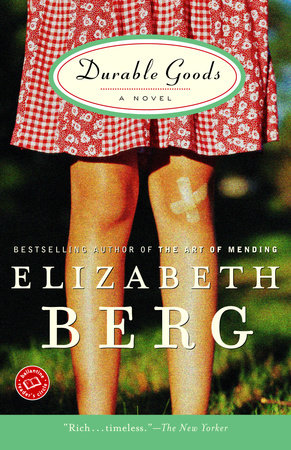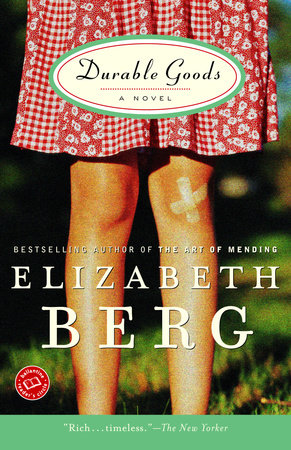Excerpt
Durable Goods
Well, I have broken the toilet. I flushed, the water rose, then rose higher, too much. I stared at it, told it, “No!” slammed the lid down, then raised it back up again. Water still rising. Water still rising. I put the lid down, turned out the light, tiptoed out of the bathroom, across the hall, and into my bedroom, where I slid under my bed.
Now I hear the water hitting the bathroom floor. It goes on and on. Niagara Falls, where the honey-mooners go and do what they do. There is the heavy tread of his footsteps coming rapidly up the stairs. I hear him turn on the bathroom light and swear softly to himself. “Katie!” he yells. He comes into my room. I stop breathing. “Katherine!” I am stone. I am off the planet, a star, lovely and unnamed. He goes into my sister’s room. “What the hell did you do to the toilet?”
“I didn’t do anything!” she says. “I’m doing my homework! Katie probably did it!”
“She’s not even here,” he says.
“She is, too.”
Oh, my heart, aching and loud.
He comes out into the hall, yells my name again. I close my eyes. “She’s not here!” he says. “So don’t tell me she did it! You did it! And by God, you’ll clean it up!”
“I didn’t do it!” she yells, and I hear him slap her, and I know that next he will drag her by the arm and point to the mess on the bathroom floor. That’s what I was avoiding. That’s why I am under the bed. I hear Diane start crying, hear her go downstairs for the mop and bucket, like he told her to do. I open my eyes, breathe. The next time I go to the PX I will buy Diane a Sugar Daddy. I look up at the springs in my mattress. Uniform and sensible. Close together in straight lines. Spiraling gracefully upward.
We live in Texas on an army base, next to a parade ground. Every morning when I wake up I hear a drill sergeant yelling pieces of songs to the straight lines of men marching, marching, all stepping onto their left foot at the same time, all dressed exactly alike, all staring straight ahead and yell-singing back to him. Many of them have terrible complexions. They sound like yelping puppies when they sing, and I feel sorry for them in the same way I feel sorry for puppies: their pink bellies, the way they do not know what will happen to them. The faces on those men do not react; they only obey. It doesn’t matter that the heat is awesome, that it rises up in shimmering waves like a live thing; it doesn’t matter that later, when those men touch their car door handles, their fingers will burn or that their feet will sink slightly in the sun-softened asphalt of the parking lot. On the marching field, there are no trees. The men’s skin will turn pink, then red, but they will not react. Once I saw a man collapse from the heat, fall neatly out of line, and lie still. None of the other men came to make a circle of concern around him. They just kept on marching, and in a while an army green truck pulled up next to the field and two men got out with a matching stretcher.
My best friend, Cherylanne, and I play with the heat. We take off our shoes and, at high noon, walk on blacktop. The one who gets farthest, wins. Also, we make sun tea; and occasionally we try to fry eggs on the sidewalk. They don’t cook through. The white becomes solid at the edges only. We call Riff, the dog who lives down the block and is always loose, to come and eat the eggs from the sidewalk. He does a pretty good job, wagging his tail to beat the band the whole time. Then we hose the sidewalk off. And then we hose each other off, stun ourselves with the sudden cold.
Cherylanne is fourteen, and she is pretty. I am twelve and I am not, although Cherylanne said this is the awkward stage and I could just as likely get better. We watch.
Our houses are connected in a row of other houses, six units all in a brick rectangle. Cherylanne lives right next door to me. When we sit out on our front porches, we can nearly lean over and touch. Our fathers’ names and ranks are posted outside our doors, above our mailboxes. We have look-alike bushes in the front and the back.
Before we moved to Texas, my father came home with cowboy hats for all of us. “This is not a joke,” he said. “You’ll have to wear these down there. It’s some serious heat.” My mother was alive then and he put a hat on her first. It was white. He stepped back, regarded her while she held statue-still. Then he smiled and so did she. He never hit my mother. She was the place where he put his tenderness. And I knew she loved him in a way that was huge, but also that she was afraid of him. Otherwise, she would not have laughed when she was being most serious with him. And she would have stopped him sometimes, like when he lunged up at us at the dinner table. Once, Diane was eating corn when he hit the back of her head, and the corn all fell out of her mouth. At first, I thought it was her teeth. I saw my mother clench her napkin, raise her fist the slightest bit, then lower it. I could feel an invisible part of her reach out to touch Diane, then come to hold me, too.
Diane has a boyfriend. Sometimes when they are down in the basement listening to records I hear her giggle and whisper, “Why don’t you act right?” This sets my imagination aflame.
I lie naked on my bed in the afternoons when no one is home. I find a place in the sun, where the light is good, and look to see if anything is happening. Nothing is ever happening. “You should see some hair coming in by now,” Cherylanne tells me. She has her period. She has everything. Nothing is happening to me. “If you want to know how it feels to have breasts, put some socks in your sister’s bra and wear it around some,” Cherylanne said. I did it. It felt fine. I put on one of Diane’s sweaters, too, then felt myself in a line from my throat clear to my hips. I tied a scarf around my neck, put on Diane’s reddest lipstick, stared into the mirror. “Why don’t you—” I stopped, put some Evening in Paris behind my ears. Then, “Why don’t you act right?” I said. I smiled, showing no teeth. Mysterious. “Why don’t you just act right, Dickie?” That is his name. Dickie.
After an hour or so, I come out from under my bed. Diane is back in her room. She is not crying anymore. I think my father is probably in the living room, watching television.
I move down the stairs, holding on to the wall to steady my steps. I can hear the television. Bonanza. Good. I go past the living room, out through the kitchen and the back door. Then I come in through the front and bang the screen door so he’ll be sure to hear it. I go into the living room, stand before him. Not in the way of the television. “Hi, Dad.”
“Where’ve you been?”
“Cherylanne’s.”
He adjusts the toothpick in his mouth. “Did you finish your homework?”
“We didn’t have any.”
“Go to bed.”
“All right.”
When I am halfway up the stairs, he says, “Come here, and you can take my boots off for me.”
I sit on the floor before him, unlace his combat boots. My father is important in the army, a colonel. Men on the street salute our car. Sometimes it was only my mother and me, but they didn’t know. They stopped, stood up serious straight, and saluted us while we drove past, giggling.
I like unlacing his boots. I only have to remember not to make a face at how his feet smell when I get done and take the boots off. They are to be lined up by his chair. Left boot to my right. Right boot to my left. Sometimes I say this to myself when I am showering.






